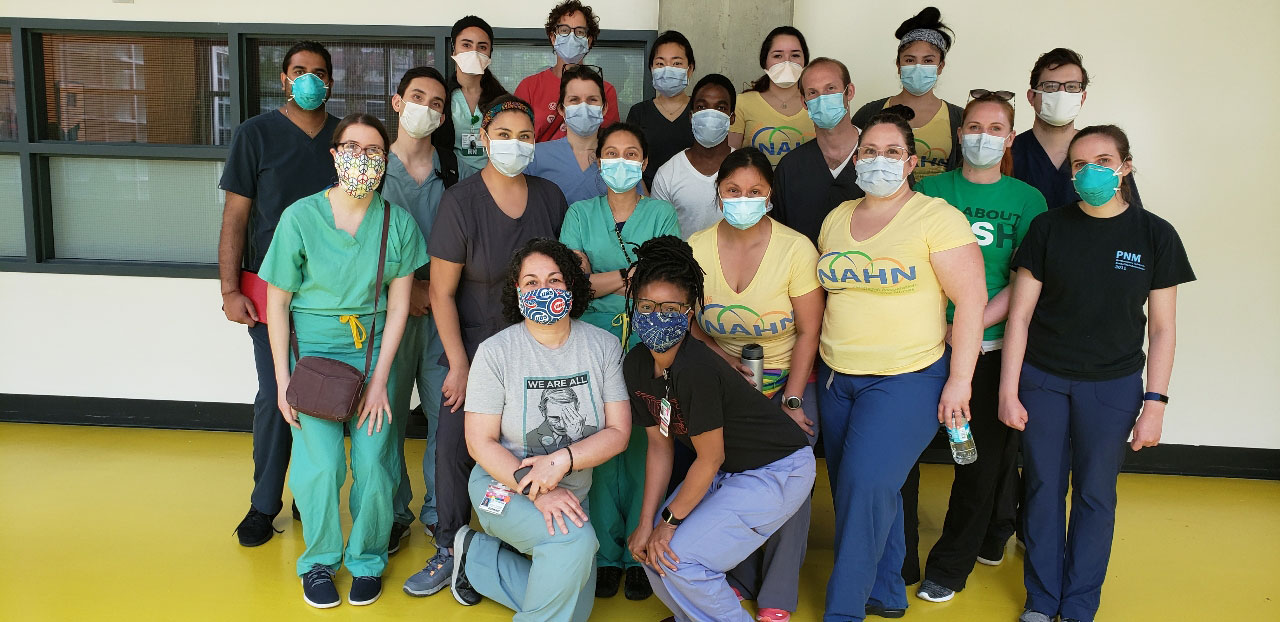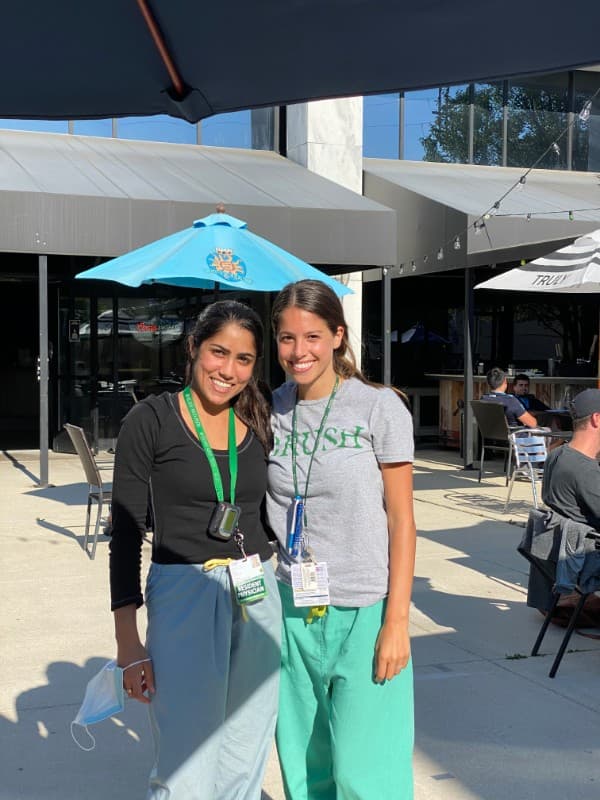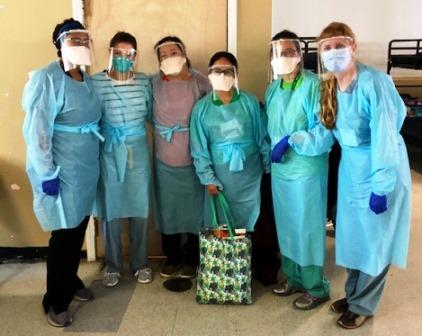-
The Medical Education track is a one year track with Internal Medicine, available to residents in their last year of training with an interest in pursuing a career in academic medicine. The aim of the track is to provide teaching on how to be an effective educator, various teaching opportunities at the medical school and residency level, shadowing experiences with academic leaders, and faculty support for a scholarly project related to medical education.
Track components
-
One month elective
- Self-directed learning with one on one faculty review on key medical education topics including clinical reasoning, bedside teaching, teaching techniques, conflict resolution, leadership, setting expectations, lecture skills, feedback, and small group facilitation
- Supervised teaching experiences
- Teaching resident on general medicine ward post-call rounds
- Senior report
- Intern report
- Sub-intern report
- Third year medical student clinical reasoning rounds
- First and second year medical student pathophysiology classroom teaching
- Medical student physical exam teaching
- Journal club
- Noon conference on medical education topic
- Shadowing experience with GME/UME leaders
- Longitudinal QI or curricular development project
Sample Projects
- Virtual general medicine curriculum for third year medical students
- Simulation lab curriculum for rapid response/code scenarios
- Evidence based physical exam curriculum for general medicine ward residents
- Resident and attending curriculum on delivering effective feedback
For those interested in medical education, but do not wish to pursue the full track, a two week elective is available with similar experiences listed as those above.
-
-
The Health Equity track was created to address both global and local health equity issues, encompassing the idea that “Global is Local”. The purpose of the track is to empower residents with knowledge, skills, and experiences that they can use to advocate for health equity throughout their careers. The track provides a supportive environment through which residents can collaborate with RUSH service initiatives and research, both locally and globally.
Mission
Our mission is to train culturally competent physicians to identify health disparities with the goal of improving health outcomes and eliminating health inequities, both locally and globally.
Objectives
- Establish an understanding of the health inequities faced by individuals locally on Chicago’s West Side and globally in the Dominican Republic and Haiti.
- Create a supportive environment that fosters and promotes discussion of topics relevant to Health Equity, including Advocacy, Structural Racism, and Social Determinants of Health.
- Equip residents with the practical tools and knowledge to engage in experiential learning and service in under-resourced settings.
- Promote participation in educational activities including journal clubs and lecture series.
- Provide mentorship throughout the duration of the track, including completion of a scholarly project.
Global Health
The Global Health Branch is selectively offered to residents who desire a broader and deeper exposure to service and learning in global health.
Health care providers from RUSH have been supporting and assisting local communities in the Dominican Republic and Haiti to establish and sustain public health and medical services for the past sixteen and eleven years respectively. On site work occurs quarterly to foster continuity and sustainability within the communities. Teams are multi-specialty with volunteers from medicine, surgery, nursing, physical therapy, and pharmacy. Trip experiences are one week long in duration with opportunities to participate on both Primary Care and Surgical Trips. The goal is for time to be spent in both countries by the end of the track experience.
In addition to yearly travel, Global Health Branch residents are expected to complete a scholarly project. Examples of previous projects are:
- Survey to assess barriers in Global Health research
- Study to assess etiology of reports of Vaginal Discharge in Rural Haitian Community
- Screening for depression and associated factors in Dominican Republic Community
- Using WhatsApp to improve education and Blood Pressure Control
- Needs Assessment of new partner community in the Dominican Republic
- QI to assess diabetic education and improvement in control in Dominican Republic Community
For those residents interested in a Global Health experience, but are not looking for a three year commitment, we do offer a Global Health Elective which is a one time, two week experience. Of note, priority is given to Track residents.
RUSH partners with the non-governmental organization, Community Empowerment, whose mission is to work with local leadership in underserved communities to provide essential health care, while fostering the development of self-sustaining health care systems.
Learn more about the Global Health Track
Community Health
Community Health Branch will have a focus on healthy equity in the community. RUSH has had a strong commitment to the West Side of Chicago stemming from a deep desire to improve the health and well-being of our surrounding communities. RUSH Anchor Mission Strategy outlines the efforts aimed at reducing the social, economic, and environmental inequities faced by individuals living on the West Side.
Inspiration is drawn from this commitment to provide Community Health Branch residents with the opportunity to work closely with RUSH community partners. Experiences can be tailored to resident interests. Examples of experiences include COVID-19 immunization efforts, attending home-based primary care visits, assisting with providing non-emergency medical treatment services to individuals experiencing homelessness, spending time with the local public health department.
Each resident will develop and complete a scholarly project, which can be focused on research, quality improvement, education, or service. Guidance and mentorship for the scholarly project will be provided throughout the course of the Track.

-
The RUSH Internal Medicine Residency offers a two year Quality Improvement and Patient Safety Track. Participating residents will have special guidance on a specific project of their choosing from mentors who are enthusiastic and who have access to resources, data, and statistical help.
During the first year of the track, residents (usually working in pairs) will develop and implement a QI project under faculty supervision. Projects will be designed to directly improve patient care, satisfy the residency program requirement for scholarship, and ideally lead to nationally presented abstracts and publication in peer reviewed journals.
In the second year of the track, residents will participate in a “Safety Rotation” where they will have the opportunity to work alongside hospital patient safety leadership through the office chief medical officer (while also having time to finish their projects). This allows residents to gain first-hand experience seeing and understanding the broader organizational efforts to improve safety and quality on a global level.
This track is an ideal for anyone interested in academic hospital medicine, hospital administration, quality and safety, or healthcare business analytics.
Quality improvement driven by residents
So far, our track residents have been involved in number of QI projects on various subjects, including:
- Transfusion reduction and blood utilization optimization
- Reduction of telemetry usage on GMF
- Improving AAA screening in outpatient clinics
- Reduction of TTE orders during the workup of syncope
- Optimization of oxygen utilization on GMF
- Antibiotic time-out/antibiotic stewardship
- Reducing unnecessary Flu/RPP testing
- Improving AVS discharge communication
- Improving feedback on GMF
- Reducing unnecessary testing in pre-op clinic
- Improving colorectal cancer screening in RUI clinics
- Improving nightfloat handoff process
- Reducing unnecessary ICU admissions
- Improving outpatient continuity in resident clinic
Many of these projects have resulted in significant cost savings, improvements in patient safety/flow, and also have been presented in local/regional forums, as well as at national conferences.

Pictured: QI Track participants Esha & Gianna, Med-Peds class of 2023 Learn more about the Patient Safety and Quality Improvement Track
-
KidsCARE (Community Advocacy at RUSH for Equity)
The RUSH Pediatric Residency Program established their Advocacy Track in July 2020. Residents learn about different ways they can help advocate for their patients through experiences with various community organizations. This will provide motivated residents the opportunity to have a longitudinal experience in order to strengthen their ability to become future leaders in advocacy on community, state, and national levels.
Advocacy is a vital part of every pediatrician's career. Our mission is to support motivated residents in their journey to becoming pediatricians who are excited and competent in advocating for patients and families on individual, institutional, community and legislative levels. This will involve learning how to effectively work with community partners and develop leadership skills to promote the well-being and health of children. Now more than ever, we need young physicians to rise to the challenge of finding equity for all our patients." - KidsCARE Mission Statement
- Up to 2 residents will be selected based on submitted CVs and personal statements. Residents in the Global Health Track are excluded.
- Self-study curriculum developed in conjunction with the course directors
- Minimum of 2 weeks of Advanced Advocacy during PL2 and PL3 years
- Completion of a Longitudinal Advocacy Project
- Present at Grand Rounds
- Submit abstract/presentation
Core topics
- Social Determinants of Health/ACES
- Empowering Pediatricians to Promote Patient Health
- Vulnerable Populations (Medically Complex/Special Needs)
- Safety/Prevention/Health Promotion
- Community Partnerships/Engagement (schools, libraries)
- Diversity, Equity and Inclusion

Pictured: Peds and Med-Peds faculty at a shelter as part of the RUSH COVID Rapid Response Team
- Get Health Care
- About
- Giving
- Find Faculty
- Library
- Rush U Portal
-
I am a...
Select from the list below to customize your experience: Select a new categoryI am a:
- Get Health Care
- About
- Giving
- Find Faculty
- Library
- Rush U Portal
-
I am a...
Select from the list below to customize your experience: Select a new categoryI am a:

